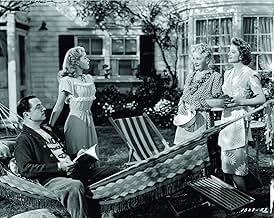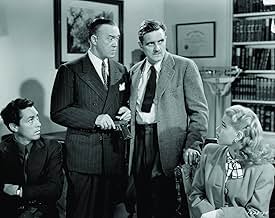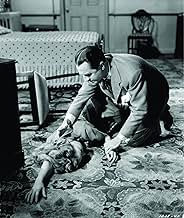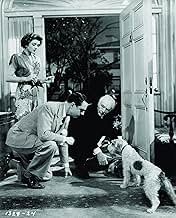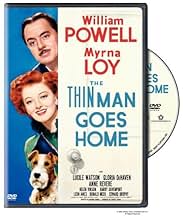IMDb RATING
7.3/10
6.6K
YOUR RATING
Nick, a private detective, visits his hometown with wife Nora. Locals believe he's investigating a case. When someone is murdered on his doorstep, Nick gets embroiled in solving the crime de... Read allNick, a private detective, visits his hometown with wife Nora. Locals believe he's investigating a case. When someone is murdered on his doorstep, Nick gets embroiled in solving the crime despite intending a vacation.Nick, a private detective, visits his hometown with wife Nora. Locals believe he's investigating a case. When someone is murdered on his doorstep, Nick gets embroiled in solving the crime despite intending a vacation.
Gloria DeHaven
- Laura Ronson
- (as Gloria De Haven)
Anita Sharp-Bolster
- Hilda
- (as Anita Bolster)
Featured reviews
This entry in the "Thin Man" series is enjoyable in itself, and it also works well as a change-of-pace from the rest of the series, in placing the familiar Nick and Nora characters in a new setting, when Nick returns to his old home town. It makes for a much different atmosphere, since Nick is received quite differently at home than he is in the big city where his crime-solving skills are so renowned.
Some things, of course, are still the same. William Powell is as witty and elegant as always, Myrna Loy is as engaging and as charming as ever, and the mystery that crops up is interesting and enjoyable. The screenplay does a nice job of keeping the best elements of the series while placing Nick in some new situations. The Powell/Loy characterizations of Nick and Nora are so good that when you see them in a somewhat new setting like this, you take an interest in them as you would old friends.
Harry Davenport heads up a very good supporting cast, and he gives one of his many fine character performances as Nick's father. The relationship is quite believable, and it's easy to empathize with Nick in his inability to please his father.
For all that this is a lesser-known movie in the "Thin Man" collection, it is quite good. The mystery itself is set up cleverly and efficiently, and it has the same combination of the offbeat and the logical that you hope for in these features. It's well worth seeking out for anyone who enjoys the "Thin Man" films.
Some things, of course, are still the same. William Powell is as witty and elegant as always, Myrna Loy is as engaging and as charming as ever, and the mystery that crops up is interesting and enjoyable. The screenplay does a nice job of keeping the best elements of the series while placing Nick in some new situations. The Powell/Loy characterizations of Nick and Nora are so good that when you see them in a somewhat new setting like this, you take an interest in them as you would old friends.
Harry Davenport heads up a very good supporting cast, and he gives one of his many fine character performances as Nick's father. The relationship is quite believable, and it's easy to empathize with Nick in his inability to please his father.
For all that this is a lesser-known movie in the "Thin Man" collection, it is quite good. The mystery itself is set up cleverly and efficiently, and it has the same combination of the offbeat and the logical that you hope for in these features. It's well worth seeking out for anyone who enjoys the "Thin Man" films.
It's 1945, the trains are packed with people, Asta doesn't remain hidden under Nora's fur coat so Nick, Nora and Asta end up in the baggage car as they travel to Nick's home town. And Nick is drinking only cider - his father never approved of drink. Thus begins, "The Thin Man Goes Home," made as the war was ending and a lot of people whose lives had changed were thinking about going home.
Nick, it turns out, has an uneasy relationship with his doctor dad because he himself never became a doctor. When the inevitable mystery arises around a murder, Nora wants Nick to solve it to impress his dad.
The fact is, the scripts of "The Thin Man" series never mattered. It was always the acting and interaction of William Powell and Myrna Loy, and here, as usual, they're great - loving, flippant, and funny. Since Nick is always falling on the floor or getting hit on the head, it's hard for anyone to believe he's sober. At a charity dance, in order to do some investigating, he gives his dance tickets to a sailor and Nora becomes his partner. The dance scene is hilarious as the sailor tosses Nora all over the place and swings her around with the kind of maneuvers you see in pair figure skating.
The war is still on so the story involves espionage. A very young Gloria de Haven does nicely as a self-consciously over-dramatic young woman; Harry Davenport and Lucile Watson are great as Nick's parents; and the later blacklisted Anne Revere does a fine job as Crazy Mary.
William Powell could read the phone book with class and humor; Loy looks beautiful and their teamwork has never been better. Highly recommended.
Nick, it turns out, has an uneasy relationship with his doctor dad because he himself never became a doctor. When the inevitable mystery arises around a murder, Nora wants Nick to solve it to impress his dad.
The fact is, the scripts of "The Thin Man" series never mattered. It was always the acting and interaction of William Powell and Myrna Loy, and here, as usual, they're great - loving, flippant, and funny. Since Nick is always falling on the floor or getting hit on the head, it's hard for anyone to believe he's sober. At a charity dance, in order to do some investigating, he gives his dance tickets to a sailor and Nora becomes his partner. The dance scene is hilarious as the sailor tosses Nora all over the place and swings her around with the kind of maneuvers you see in pair figure skating.
The war is still on so the story involves espionage. A very young Gloria de Haven does nicely as a self-consciously over-dramatic young woman; Harry Davenport and Lucile Watson are great as Nick's parents; and the later blacklisted Anne Revere does a fine job as Crazy Mary.
William Powell could read the phone book with class and humor; Loy looks beautiful and their teamwork has never been better. Highly recommended.
Everybody has at least one skeleton in their closet, and Nick Charles is the man who can bring them out into the daylight. The fifth film in the excellent 'Thin Man' series sees our favourite married detectives, Nick and Nora Charles (William Powell and Myrna Loy), visiting Nick's parents in the small town of Sycamore Springs, a sleepy locale where everybody knows everybody and crime is practically non-existent
or so they thought! The famous detective's arrival is greeted with a wave of controversy, despite his own insistence that the visit is merely a quiet vacation. With everybody under the impression that Nick is investigating an important case, long-forgotten skeletons begin to emerge from their hiding-places, a young artist is shot dead on the doorstep and an ordinary-looking painting of a windmill becomes a vital clue in identifying his murderer.
'The Thin Man Goes Home' was the first film in the series not directed by W.S. Van Dyke, after he committed suicide in February 1943. Nonetheless, Richard Thorpe does a good job of recreating the mystery and good humour of the previous instalments, working off a script from Robert Riskin, Harry Kurnitz and Dwight Taylor. There are also a few notable adjustments to the usual formula: the action takes place in a small town rather than the city, and Nick Charles has gone completely teetotal {no doubt a consequence of the WWII liquor rationing}. Aside from obviously solving the mystery and apprehending the killer, the film has another important sub-plot concerning Nick and his disapproving father. Nora makes it her goal to convince Dr. Charles (Harry Davenport) that his son is, indeed, a detective genius, and fuels the rumours in a not-so-subtle fashion that he is here on a case. However, his father won't believe that Nick has gone off drinking, and various unfortunate moments of bad-timing do little to prove him otherwise.
Of course, the main reason we watch 'The Thin Man' movies is to enjoy the witty banter and playful rivalry between husband and wife, and a lot of it is still here, even if it takes a back-seat to the murder mystery itself. Just like the audience, Nora believes that she understands Nick's mystery-solving tactics to the letter, and she enthusiastically narrates his technique to the attentive Dr. Charles, occasionally tossing in her own opinion of the identity of the killer. Of course, she's almost always wrong. This mystery is a muddled affair, with seemingly everyone guilty for at least something, but it's the killer's name that proves a real surprise.
'The Thin Man Goes Home' was the first film in the series not directed by W.S. Van Dyke, after he committed suicide in February 1943. Nonetheless, Richard Thorpe does a good job of recreating the mystery and good humour of the previous instalments, working off a script from Robert Riskin, Harry Kurnitz and Dwight Taylor. There are also a few notable adjustments to the usual formula: the action takes place in a small town rather than the city, and Nick Charles has gone completely teetotal {no doubt a consequence of the WWII liquor rationing}. Aside from obviously solving the mystery and apprehending the killer, the film has another important sub-plot concerning Nick and his disapproving father. Nora makes it her goal to convince Dr. Charles (Harry Davenport) that his son is, indeed, a detective genius, and fuels the rumours in a not-so-subtle fashion that he is here on a case. However, his father won't believe that Nick has gone off drinking, and various unfortunate moments of bad-timing do little to prove him otherwise.
Of course, the main reason we watch 'The Thin Man' movies is to enjoy the witty banter and playful rivalry between husband and wife, and a lot of it is still here, even if it takes a back-seat to the murder mystery itself. Just like the audience, Nora believes that she understands Nick's mystery-solving tactics to the letter, and she enthusiastically narrates his technique to the attentive Dr. Charles, occasionally tossing in her own opinion of the identity of the killer. Of course, she's almost always wrong. This mystery is a muddled affair, with seemingly everyone guilty for at least something, but it's the killer's name that proves a real surprise.
All the Thin Man films are great to watch, but this is one with which I find a bit easier to identify. Riskin, the writer of this film and long time scriptwriter for Frank Capra, was also the guy who wrote "It Happened One Night" and "Meet John Doe". This New York City born writer's attraction to average Joe small town values over Cosmopolitan glitz and decadence obvious in those two films is plain to see here. This is probably the image a lot of successful urbanites had about moving to the suburbs after WW2.
This is sort of an odd bird among Thin Man films in a couple of ways. First of all, Nick is astonishingly sober for a change. Don't look for any of those scenes of Nick and Nora trying to drink each other the table at some New York nightclub in this one. In fact, the nightclubs and high rises are totally gone as Nick takes Nora the glamorous New York socialite back for a visit to Nick's hometown, which bears a fairly strong likeness to Andy Hardy's. Nick's father is a retired M.D. not unlike the ones in the Norman Rockwell paintings. He wanted Nick to follow in his footsteps as a small town doctor instead of becoming a big city policeman and this is the first time the two of them have gotten together in years. This father-son reconciliation is the explanation for Nick's sudden uncharacteristic attraction to a sober, healthy lifestyle.
Nick's father is actually fairly proud of Nick and keeps a scrapbook about all his adventures. The whole town knows about Nick Charles the famous Detective. I sort of see invisible images of G.I.s returning home from WW2 in a lot of this movie. Nick's celebrity as a tough, smart local boy who went off to bring gun toting gangsters to justice in the big city of aristocratic sophisticates and Broadway nights is not very far removed from how most Americans probably saw the guys who went off to liberate Paris and Europe in WW2. Nora fits into that picture as a sort of "Mrs. Miniver" figure of what American's admired about European sophication brought back home to meet the folks.
The homecoming hero vision of Nick peacefully turning into a happy coach potato in a post war suburbia however is not what we want to see. What everybody loves about the Thin Man films is their contrary to Hollywood stereotype revelation that life after marriage can actually be exciting. Nora decides to get Nick off the coach with an "I Love Lucy" sort of plot twist that spreads a rumor around town that Nick is secretly working on a detective case. The result of course is that all the various local characters with small town secrets to hide think he's after them and all the mystery murders and skeletons start coming out of the closet like we've all been waiting to see. Nick and Nora are such a fun couple, aren't they?
This is sort of an odd bird among Thin Man films in a couple of ways. First of all, Nick is astonishingly sober for a change. Don't look for any of those scenes of Nick and Nora trying to drink each other the table at some New York nightclub in this one. In fact, the nightclubs and high rises are totally gone as Nick takes Nora the glamorous New York socialite back for a visit to Nick's hometown, which bears a fairly strong likeness to Andy Hardy's. Nick's father is a retired M.D. not unlike the ones in the Norman Rockwell paintings. He wanted Nick to follow in his footsteps as a small town doctor instead of becoming a big city policeman and this is the first time the two of them have gotten together in years. This father-son reconciliation is the explanation for Nick's sudden uncharacteristic attraction to a sober, healthy lifestyle.
Nick's father is actually fairly proud of Nick and keeps a scrapbook about all his adventures. The whole town knows about Nick Charles the famous Detective. I sort of see invisible images of G.I.s returning home from WW2 in a lot of this movie. Nick's celebrity as a tough, smart local boy who went off to bring gun toting gangsters to justice in the big city of aristocratic sophisticates and Broadway nights is not very far removed from how most Americans probably saw the guys who went off to liberate Paris and Europe in WW2. Nora fits into that picture as a sort of "Mrs. Miniver" figure of what American's admired about European sophication brought back home to meet the folks.
The homecoming hero vision of Nick peacefully turning into a happy coach potato in a post war suburbia however is not what we want to see. What everybody loves about the Thin Man films is their contrary to Hollywood stereotype revelation that life after marriage can actually be exciting. Nora decides to get Nick off the coach with an "I Love Lucy" sort of plot twist that spreads a rumor around town that Nick is secretly working on a detective case. The result of course is that all the various local characters with small town secrets to hide think he's after them and all the mystery murders and skeletons start coming out of the closet like we've all been waiting to see. Nick and Nora are such a fun couple, aren't they?
This film is hilarious! Powell and Loy's chemistry just doesn't let up, even after four sequels. I've now seen three of these films (The first, third and fifth), and the quality is as high as ever. I liked this one better than the third (Another Thin Man), though it's not quite as good as the first (The Thin Man).
The humour is excellent. These films wouldn't be half as good without the oft-subtle, always hilarious dialogue rampant throughout. And Powell and Loy are always perfect, they never miss a beat. One of the problems I had with the third one was that it felt forced, the humour just wasn't top-notch. But it's full-force here, nearly at the level of the first one. As well, the story is much more interesting than the third one, and almost at the level of the first. The first one had the spark, the originality, that won't ever be reproduced. But this script is sharp (although I really missed all of the great drinking jokes;), and it didn't (thankfully) have the brat of a baby;) And Asta is as cute as ever, what more could I ask for??
It's not perfect, it's not as good as the first. But it's up there! Another definite must-see; I'd recommend these films to all, an eternal classic!! 8/10.
The humour is excellent. These films wouldn't be half as good without the oft-subtle, always hilarious dialogue rampant throughout. And Powell and Loy are always perfect, they never miss a beat. One of the problems I had with the third one was that it felt forced, the humour just wasn't top-notch. But it's full-force here, nearly at the level of the first one. As well, the story is much more interesting than the third one, and almost at the level of the first. The first one had the spark, the originality, that won't ever be reproduced. But this script is sharp (although I really missed all of the great drinking jokes;), and it didn't (thankfully) have the brat of a baby;) And Asta is as cute as ever, what more could I ask for??
It's not perfect, it's not as good as the first. But it's up there! Another definite must-see; I'd recommend these films to all, an eternal classic!! 8/10.
Did you know
- TriviaThis movie was to begin production in 1942, but Myrna Loy refused the part. Instead, she went to New York where she married car rental heir John Hertz Jr. and worked for the Red Cross war-relief effort. The movie almost began shooting with actress Irene Dunne as Nora Charles.
- GoofsIt has been said that the rifle in the film was a Bren gun and not a Japanese weapon. However, the Nambu machine gun looks very much like a Bren gun. The stock is the most easily spotted give-away. The Bren gun's stock come straight back from behind the pistol grip right behind the trigger guard, while the Nambu's stock has a slight drop to it, right behind the pistol grip. The gun in this film is, in fact, a Japanese Nambu machine gun.
- ConnectionsFeatured in Twenty Years After (1944)
- SoundtracksHappy Birthday to You
(uncredited)
Written by Mildred J. Hill and Patty S. Hill
Sung a cappella by Lucile Watson and Harry Davenport
Everything New on HBO Max in July
Everything New on HBO Max in July
Looking for something different to add to your Watchlist? Take a peek at what movies and TV shows are coming to HBO Max this month.
- How long is The Thin Man Goes Home?Powered by Alexa
Details
- Release date
- Country of origin
- Language
- Also known as
- El regreso de aquel hombre
- Filming locations
- Production company
- See more company credits at IMDbPro
Box office
- Budget
- $1,000,000 (estimated)
- Runtime1 hour 40 minutes
- Color
- Aspect ratio
- 1.37 : 1
Contribute to this page
Suggest an edit or add missing content




